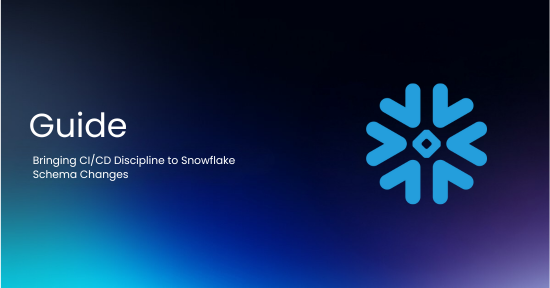Bringing CI/CD Discipline to Snowflake Schema Changes
Key Points
This guide, "CI/CD for Snowflake Schema Changes: A Step-by-Step Guide," explains how Liquibase Secure helps automate and govern Snowflake schema changes, reducing risk and speeding up deployments.
Key challenges in managing Snowflake schema changes include:
- Manual SQL scripts and disconnected environments leading to slow delivery.
- Lack of centralized audit trails and manual rollbacks.
- Inconsistency and outages due to multiple teams managing objects across environments.
Traditional tools and even those included with Snowflake often fall short due to a lack of visibility, native rollback mechanisms, data governance enforcement, and operating at enterprise scale.
Change management platforms like Liquibase Secure help extend best practices and CI/CD integration to Snowflake. Gain the benefits of automation, governance, auditability, better collaboration, and confidence along with targeted rollbacks to increase reliability of your data platforms.
Introduction
As data teams scale their use of Snowflake, managing schema changes becomes a growing challenge. Manual SQL scripts, ticket-based reviews, and disconnected environments slow delivery and increase the risk of downtime, drift, and audit failures.
This guide explores how Liquibase Secure helps organizations bring CI/CD discipline to Snowflake schema changes, ensuring fast, compliant, and predictable deployments across dev, test, and prod environments.
Why Schema Change Is Hard in Snowflake
Snowflake delivers incredible scale, flexibility, and ease of use. But when it comes to schema change, teams often run into problems:
- SQL scripts live in different folders or repos
- Production changes happen outside of source control
- Rollbacks are manual, if they happen at all
- There’s no centralized audit trail
These problems get worse when multiple teams manage Snowflake objects across multiple environments. The result? Inconsistency, outages, and long audit cycles.
Why Other Tools Fall Short
Many teams try to manage Snowflake schema changes using traditional tools like SQL script runners, homegrown frameworks, or general-purpose DevOps platforms.
But these solutions often lack critical capabilities, including:
- No visibility into who changed what and when
- No native rollback or change validation mechanisms
- No enforcement of data governance policies
- No integration with Snowflake’s unique object permissions or DDL nuances
Even popular infrastructure-as-code tools fall short because they treat database change as a static artifact, not a dynamic and interdependent process.
Liquibase Secure is purpose-built to handle database change across all environments and includes built-in visibility, policy enforcement, and recovery — all critical for Snowflake success.
What Is Liquibase Secure?
Liquibase Secure is a database change management solution built for teams running mission-critical workloads. For Snowflake users, it brings automation, visibility, and policy enforcement to every schema change.
With Liquibase Secure, you can:
- Track every change in version control
- Apply changes automatically through your CI/CD pipeline
- Enforce internal policies (naming, tagging, object protections)
- View a complete audit trail of who changed what and when
- Roll back cleanly when something goes wrong
Benefits of CI/CD for Snowflake Schema Changes
- Automation: Apply changes through your CI/CD system for consistency and speed
- Governance: Enforce internal standards and prevent risky changes before they deploy
- Auditability: Log every change across environments for compliance and traceability
- Rollback: Revert changes quickly and safely when needed
- Collaboration: Enable devs and platform teams to work from the same source of truth
- Confidence: Deploy changes faster with pre-deployment checks and rollback plans
How Liquibase Secure Works with Snowflake
Liquibase Secure connects to Snowflake via secure JDBC and applies schema changes defined in declarative changelogs. These changelogs live in version control and become part of your CI/CD workflow.
You can:
- Apply changes automatically after pull requests merge
- Run pre-deployment checks to validate changes
- Block deployments that violate internal standards
- Track applied changes in the Liquibase Secure dashboard and Snowflake audit logs
This model reduces manual steps and gives you full control over your database lifecycle.

Common Use Cases
- Standardizing deployments across dev, test, and prod
- Replacing ad hoc scripts with structured changelogs
- Preventing accidental table drops or untagged columns
- Enforcing naming conventions or data residency rules
- Supporting audits in healthcare, finance, or public sector
- Integrating Snowflake with app dev CI/CD pipelines
- Reducing recovery time after failed deployments
Getting Started: Steps to Implement
1. Install Liquibase Secure and connect to Snowflake
2. Define changelogs using supported formats (XML, YAML, JSON, or SQL)
3. Store changelogs in Git or other source control
4. Integrate with your CI/CD platform (e.g., GitHub Actions, Jenkins)
5. Set up policy enforcement and rollback logic
6. Test and apply changes in dev/test before deploying to prod
7. Track and monitor changes across all environments
Get the Liquibase + Snowflake Cheat Sheet and start building with confidence.
Best Practices for CI/CD in Snowflake
- Use changelogs for all environments — dev, test, staging, prod
- Define rollback logic alongside every change
- Automate deployments with pipeline triggers
- Use labels and contexts to scope changes
- Set up policy checks for naming, column tagging, and restricted DDL
- Review DATABASECHANGELOG regularly for drift detection
Frequently Asked Questions (FAQ)
Q: What problems does Liquibase Secure solve in Snowflake?
A: Liquibase Secure eliminates manual deployments, enforces policies, and ensures change visibility across environments.
Q: How is this different from using plain SQL scripts?
A: Liquibase Secure uses versioned changelogs that integrate with CI/CD, include rollback logic, enforce policies, and maintain a full audit trail.
Q: Does Liquibase Secure support all Snowflake object types?
A: Yes. Liquibase Secure supports DDL and DCL operations across most common Snowflake objects, including tables, views, roles, users, and warehouses.
Q: What if a change fails?
A: Liquibase Secure allows for custom rollback logic and reports failure reasons in your CI/CD pipeline.
Q: Is this a good fit for teams outside of engineering?
A: Yes. Platform teams, data engineers, SREs, and compliance leaders all benefit from standardized, auditable database change.
Q: How does Liquibase Secure compare to tools like Terraform or Flyway?
A: Unlike infrastructure-as-code tools or basic change runners, Liquibase Secure is purpose-built for database change management. It includes policy enforcement, rollback control, CI/CD automation, and cross-environment auditability.
Conclusion
Modern data delivery demands speed and trust. Liquibase Secure brings both to Snowflake. By introducing CI/CD discipline, you gain faster deployments, stronger governance, and audit-ready traceability.
No more manual changes. No more risky pushes. Just a faster, safer way to manage Snowflake schema change.
Ready for safer, faster Snowflake deployments? Request a Live Demo










